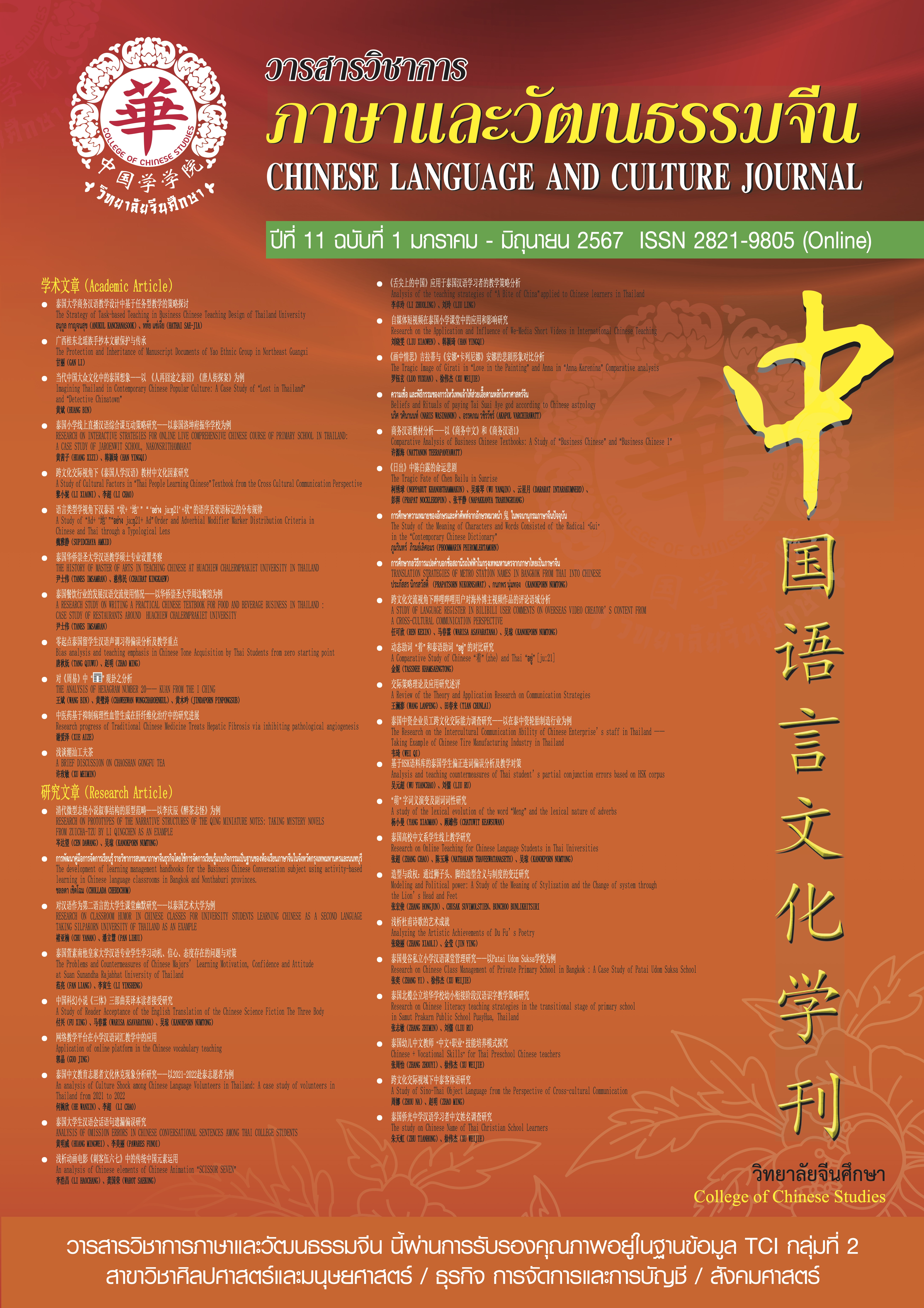การพัฒนาคู่มือการจัดการเรียนรู้รายวิชาการสนทนาภาษาจีนธุรกิจ โดยใช้การจัดการเรียนรู้แบบกิจกรรมเป็นฐาน ของห้องเรียนภาษาจีนในจังหวัดกรุงเทพมหานครและนนทบุรี
บทคัดย่อ
การวิจัยนี้มีวัตถุประสงค์เพื่อ 1. เพื่อพัฒนาคู่มือการจัดการเรียนรู้รายวิชาการสนทนาภาษาจีนธุรกิจ โดยใช้การจัดการเรียนรู้แบบกิจกรรมเป็นฐาน ของห้องเรียนภาษาจีนในจังหวัดกรุงเทพมหานครและนนทบุรี และ 2. เพื่อประเมินความพึงพอใจคู่มือการจัดการเรียนรู้รายวิชาการสนทนาภาษาจีนธุรกิจ โดยใช้การจัดการเรียนรู้แบบกิจกรรมเป็นฐาน ของห้องเรียนภาษาจีนในจังหวัดกรุงเทพมหานครและนนทบุรี เป็นการวิจัยเชิงปริมาณ กลุ่มตัวอย่างที่ใช้ในการศึกษาแบ่งเป็น 2 กลุ่ม ได้แก่ 1. ผู้เชี่ยวชาญที่ทำงานเกี่ยวกับการศึกษา การจัดการเรียนรู้ หรือการวัดประเมินผลที่มีประสบการณ์ทำงานมาแล้วไม่น้อยกว่า 5 ปี จำนวน 5 คน ทำการคัดเลือกกลุ่มตัวอย่างโดยการเลือกแบบเจาะจง (Purposive Sampling) และ 2. ผู้สอนที่ใช้คู่มือการจัดการเรียนรู้รายวิชาการสนทนาภาษาจีนธุรกิจ จำนวน 10 คน โดยโรงเรียนที่มีห้องเรียนภาษาจีนในจังหวัดกรุงเทพมหานครและนนทบุรี จำนวน 10 โรงเรียน เป็นการเลือกแบบสุ่มแบบง่ายจากห้องเรียนภาษาจีนที่ทำความร่วมมือกับสถาบันการจัดการปัญญาภิวัฒน์ โดยมีการเรียนการสอนรายวิชาการสนทนาภาษาจีนธุรกิจ เครื่องมือที่ใช้ในการเก็บรวบรวมข้อมูลแบ่งเป็น 2 ประเภท ได้แก่ 1. แบบประเมินคุณภาพคู่มือการจัดการเรียนรู้รายวิชาการสนทนาภาษาจีนธุรกิจ และ 2. แบบประเมินความพึงพอใจคู่มือการจัดการเรียนรู้รายวิชาการสนทนาภาษาจีนธุรกิจ ทำการวิเคราะห์ข้อมูลโดยค่าเฉลี่ย (Mean) และส่วนเบี่ยงเบนมาตรฐาน (Standard Deviation : S.D.) ผลการวิจัยพบว่า
- 1. คุณภาพคู่มือการจัดการเรียนรู้รายวิชาการสนทนาภาษาจีนธุรกิจ โดยใช้การจัดการเรียนรู้แบบกิจกรรมเป็นฐาน พบว่า ความเหมาะสมของด้านรูปเล่มโดยภาพรวม มีค่าเฉลี่ยเท่ากับ 4.88 ค่าความเบี่ยงเบนมาตรฐานเท่ากับ 0.30 ความเหมาะสมของด้านเนื้อหาโดยภาพรวม มีค่าเฉลี่ยเท่ากับ 4.84 ค่าความเบี่ยงเบนมาตรฐานเท่ากับ 0.28 และความเหมาะสมของด้านการนำไปใช้ประโยชน์โดยภาพรวม มีค่าเฉลี่ยเท่ากับ 4.80 ค่าความเบี่ยงเบนมาตรฐานเท่ากับ 0.44 ทั้ง 3 ด้านอยู่ในระดับมากที่สุด
- 2. ความพึงพอใจของผู้ที่ใช้คู่มือการจัดการเรียนรู้วิชาการสนทนาภาษาจีน โดยโดยใช้การจัดการเรียนรู้แบบกิจกรรมเป็นฐาน พบว่า ความเหมาะสมของด้านเนื้อหาโดยภาพรวม มีค่าเฉลี่ยเท่ากับ 3.72 ค่าความเบี่ยงเบนมาตรฐานเท่ากับ 0.95 และความเหมาะสมของด้านการนำไปใช้ พบว่า ความค่าเฉลี่ยเท่ากับ 3.74 ค่าความเบี่ยงเบนมาตรฐานเท่ากับ 1.15 ทั้ง 2 ด้านอยู่ในระดับมาก
เอกสารอ้างอิง
ณัฐวุฒิ สกุณี และอัมพร ม้าคนอง. (2561). “การพัฒนาเจตคติแรงจงูใจใฝ่สัมฤทธิ์และพฤตกิรรมการเรียนรู้วิชาคณิตศาสตร์ของนักเรียนมัธยมศึกษาปีที่ 3 โดยใช้การจัดการเรียนการสอนที่เน้นกิจกรรมเป็นฐาน”. วารสารอิเล็กทรอนิกสทางการศึกษา. [Online] แหล่งที่มา : https://so01.tci-thaijo.org/index.php/OJED/article/view/110544/86654 (30 มกราคม 2561 )
สุมาลี เชื้อชัย. (2551) การพัฒนารูปแบบการฝึกอบรมการเขียนแผนการจัดการเรียนรู้ด้วยกระบวนการเรียนรู้โดยการสังเกตผ่านเครือข่าย สำหรับนิสิตคณะครุศาสตร์ จุฬาลงกรณ์มหาวิทยาลัย. วิทยานิพนธ์ ค.ม. (การสอนและเทคโนโลยีการศึกษา) กรุงเทพฯ : จุฬาลงกรณ์มหาวิทยาลัย.
สำนักงานคณะกรรมการการศึกษาขั้นพื้นฐาน. (21 ธันวาคม 2565) “สพฐ. ประชุมเชิงปฏิบัติการการจัดทำ แนวทางการจัดการเรียนการสอนภาษาจีนและแนวทางการขอเปิดห้องเรียนพิเศษภาษาจีน” เว็บไซต์ สำนักงานคณะกรรมการการศึกษาขั้นพื้นฐาน. [Online] แหล่งที่มา :https://www.obec.go.th/archives/743797
อาภรณ์ ใจเที่ยง. (2553) หลักการสอน (ฉบับปรับปรุง). กรุงเทพฯ : สำนักพิมพ์โอเดียนสโตร์.
อาภันตรา แสงวงศ์. (2551) การพัฒนาคู่มือการจัดการเรียนรู้แบบ 4 MAT ร่วมกับการจัดการเรียนรู้แบบซิปปาที่มีผลต่อการคิดวิเคราะห์ ความคิดรวบยอดและผลสัมฤทธิ์ทางการเรียน วิชาคณิตศาสตร์เพิ่มเติมของนักเรียนชั้นมัธยมศึกษาปีที่ 5. วิทยานิพนธ์ ค.ม. (วิจัยและพัฒนาการศึกษา) สกลนคร : มหาวิทยาลัยราชภัฏสกลนคร.
ดาวน์โหลด
เผยแพร่แล้ว
รูปแบบการอ้างอิง
ฉบับ
ประเภทบทความ
สัญญาอนุญาต
ลิขสิทธิ์ (c) 2024 วารสารวิชาการภาษาและวัฒนธรรมจีน

อนุญาตภายใต้เงื่อนไข Creative Commons Attribution-NonCommercial-NoDerivatives 4.0 International License.
บทความที่ได้รับการตีพิมพ์เป็นลิขสิทธิ์ของวารสารภาษาและวัฒนธรรมจีน มหาวิทยาลัยหัวเฉียวเฉลิมพระเกียรติ
บทความใน “วารสารวิชาการภาษาและวัฒนธรรมจีน” เป็นทรรศนะของผู้เขียนโดยเฉพาะ กองบรรณาธิการไม่มีส่วนในความคิดเห็นในข้อเขียนเหล่านั้น




